GregoryBergman
Member
In 2025, digital creators have a big choice to make. Pixpa and WordPress are two top platforms for building websites. They offer different strengths in creating portfolios and selling online.
Artists and designers need a website builder that's easy to use, fast, and affordable. Pixpa is great for photographers, designers, and artists. WordPress is perfect for those who love to customize their sites.
We'll look closely at what each platform offers. We'll compare their features, prices, and how well they work for different creative fields. We'll see which one gives the best value in 2025.
Knowing the differences between Pixpa and WordPress is key. It helps you choose the right platform for your online space. Whether you're a solo photographer or a big design team, the right builder can make a big difference.
This guide will help you understand what matters most. We'll compare templates, how easy they are to use, prices, and special features. These are important for creatives who need strong ecommerce tools and portfolio platforms.
Website trends show a big move towards AI in design tools. Hostinger is at the forefront with AI tools that can create site layouts in just minutes. The web development market is growing fast, showing how technology is advancing.
Now, there are special platforms for creative people. *Content management systems* are designed for different needs. Pixpa offers over 150 customizable templates, and WordPress is the top CMS, with over 62% market share. This means creators can find the perfect tools for their projects.
Today's website builders do more than just create sites. They also offer e-commerce, marketing, and client management tools. This means you can manage your online business from one place, making it easier than ever.
If you're a photographer, artist, or small business owner, 2025's website builders are very powerful. The key is to pick a platform that fits your goals and how comfortable you are with technology.

The way users interact with these platforms is quite different. Pixpa gets an 8.4 for ease of use, beating WordPress's 7.4. This shows Pixpa is great for photographers and designers who want a simple website builder.
When it comes to design, Pixpa shines with an 8.5 rating. It's just a bit better than WordPress's 7.8. This means Pixpa is better at making websites look good and professional.
Both platforms are strong in e-commerce. Pixpa scores an 8.4, while WordPress is strong with WooCommerce. They both have many payment options and let you customize product pages.
Security and performance are where Pixpa really stands out. It gets an 8.3 for website protection, beating WordPress's 6.4. This makes Pixpa a top choice for those who value data safety.
Even though they're different, both platforms are great at making websites. Your choice depends on what you need, how tech-savvy you are, and your career goals.
Pixpa offers a fully managed website hosting solution for creative pros. Their cloud setup makes technical management easy. This lets photographers and artists focus on their work, without worrying about server details.
WordPress gives users a choice between self-hosted and hosted platforms. WordPress.com is like Pixpa, offering a managed hosting experience. On the other hand, WordPress.org lets users control their cloud infrastructure themselves, requiring them to choose and set up their hosting.
For those who want simplicity, Pixpa's hosting solution is perfect. WordPress self-hosted platforms need more technical know-how but offer more customization. Your choice depends on your comfort with website management and how much control you want.
Both platforms ensure your website is reliable with regular updates and backups. Pixpa does this automatically. WordPress self-hosted users must manage their site's security and performance themselves. Knowing these differences helps you pick the best website builder for your creative business.
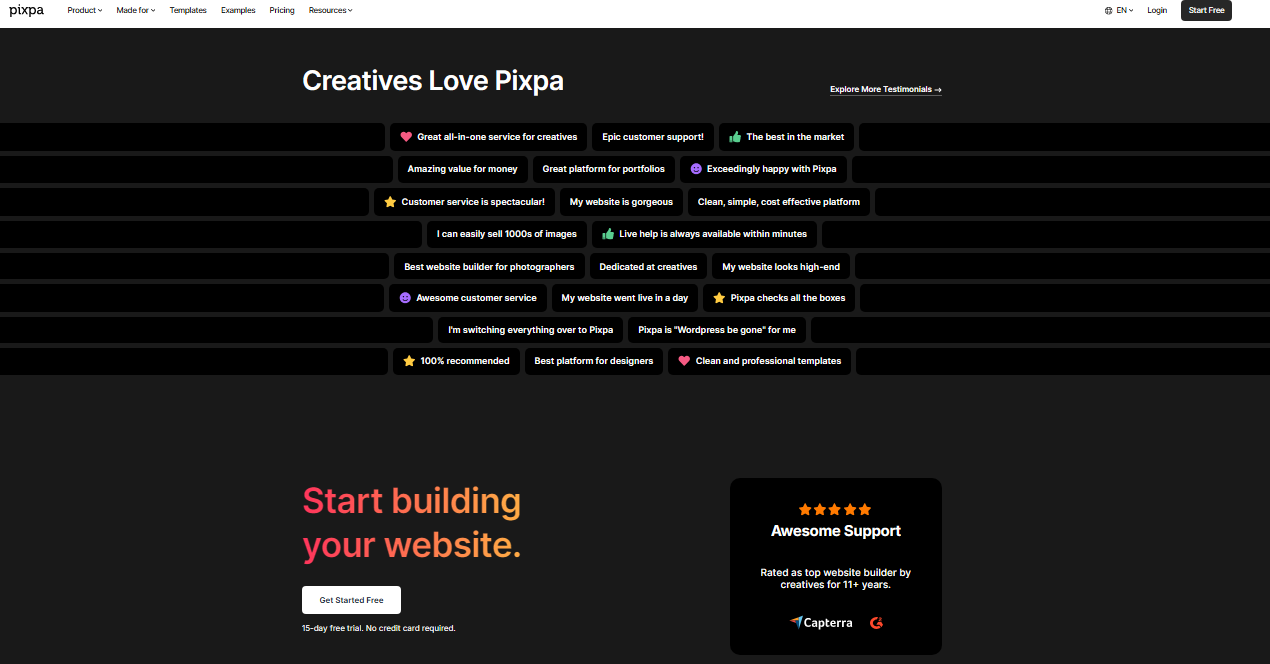
The WordPress learning curve is a bit tougher. WordPress is used by over 34% of websites online, but it can be overwhelming for new users. WordPress.org needs more technical know-how than some other platforms. Users have to learn about hosting, plugins, and setting up their site.
Pixpa is different because it has tools made just for visual storytellers. It has fewer technical hurdles for photographers and designers. Users can easily drag elements, customize galleries, and make professional websites in minutes. You don't need to know how to code, making it easy for creative pros.
WordPress is very flexible but takes more time to learn. Beginners might find it too much, needing help from tutorials and the community. But, for those who know a lot about coding, WordPress is great. Pixpa is better for those who want a quick, easy way to make a website.
Your choice depends on how comfortable you are with tech and what you need for your project. Pixpa is a good choice for creatives who want a fast, beautiful website. WordPress is better for those who are willing to spend time learning its full range of features.
WordPress has thousands of themes for almost every industry. While Pixpa focuses on quality, WordPress has a wider range. Creative folks will love the built-in customization tools for personalizing their portfolios.
Pixpa's drag-and-drop editor makes changing templates easy. You can adjust layouts, colors, and more without needing to know how to code. WordPress, on the other hand, is more complex but offers deeper customization for those who can code or use page builder plugins.
Photographers, artists, and entrepreneurs might prefer Pixpa's simplicity. Its templates are ready for visual industries, saving time and effort in creating a beautiful website.
Your choice depends on your skills, design taste, and website needs. Both Pixpa and WordPress provide strong options for a stunning online presence.
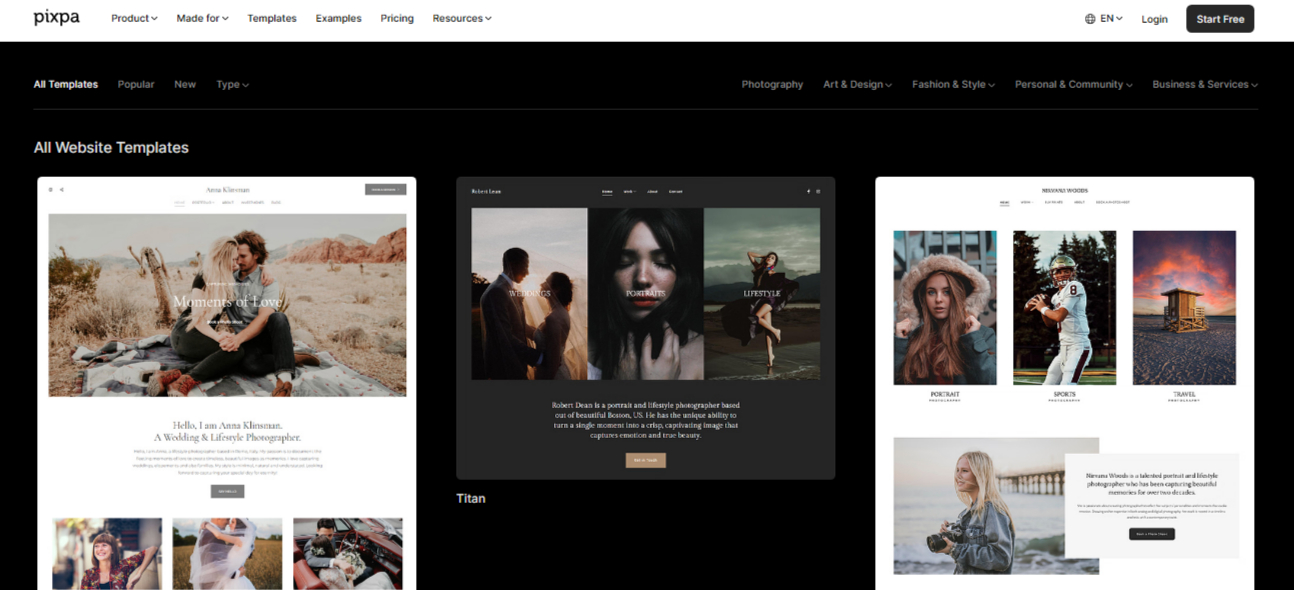
Creative entrepreneurs will love Pixpa's e-commerce tools. It lets users sell digital goods easily with secure payments. Small businesses can start online stores fast, without tech headaches.
WordPress, with WooCommerce, is a bigger e-commerce system. It's a bit harder to set up but grows with your business. It supports many payment options for customers worldwide.
Pixpa makes managing stores simple, great for photographers and artists. WordPress offers more customization for detailed product sorting and sales tracking.
Both Pixpa and WordPress get high user satisfaction scores. Pixpa scores 90%, WordPress 87%. Your choice depends on your business needs, tech skills, and sales goals.
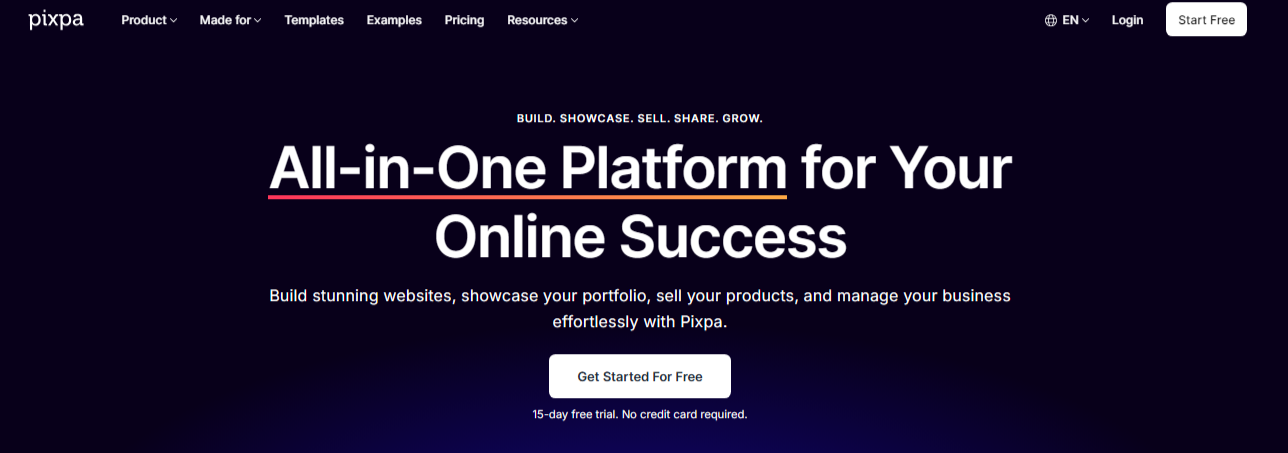
Pixpa has integrated SEO tools for photographers and artists. It offers customizable meta tags, XML sitemaps, and clean page structures. These tools make it easy to boost website visibility without needing to know a lot about tech.
WordPress offers a more detailed SEO approach. It comes with plugins like Yoast SEO for better meta tags, content analysis, and schema markup. Its wide range of plugins also supports deep social media integration and detailed digital marketing plans.
Marketing features set these platforms apart. Pixpa has easy email marketing and social media sharing tools. WordPress, on the other hand, offers more flexible options through its huge plugin market. This lets users tailor their marketing exactly how they want.
Both platforms support blogging, a key part of digital marketing. WordPress is the top choice for blogging, powering many websites. Pixpa has great blogging tools for creative pros.
Choosing the right platform depends on your marketing needs. Pixpa is great for those wanting a simple, all-in-one solution. WordPress is best for those who need lots of customization options.
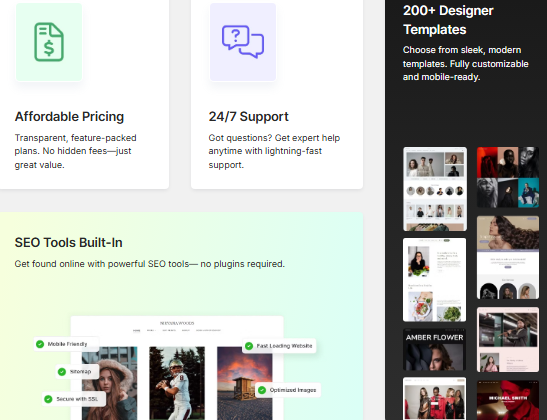
Pixpa has simple pricing from $3.60 to $15 a month, billed every six months. Their plans include key features for creatives, like portfolio sites, online stores, and client galleries. WordPress hosting costs vary based on your needs and technical needs.
WordPress.org is free for those watching their budget. *But be careful* - costs can add up. You'll need to pay for domain names, hosting, premium themes, and plugins. Hosting costs can be $5 to $30 a month, depending on your site's size and visitors.
Pixpa might save you money over time. Their plans include hosting, SSL certificates, and templates made for photographers and artists. WordPress offers more flexibility but might cost more and require more technical work.
When looking at website builder costs, think about your future goals. *Pixpa* has clear pricing, while WordPress is customizable but might be pricier. Your choice depends on your tech skills, budget, and what you need for your site.
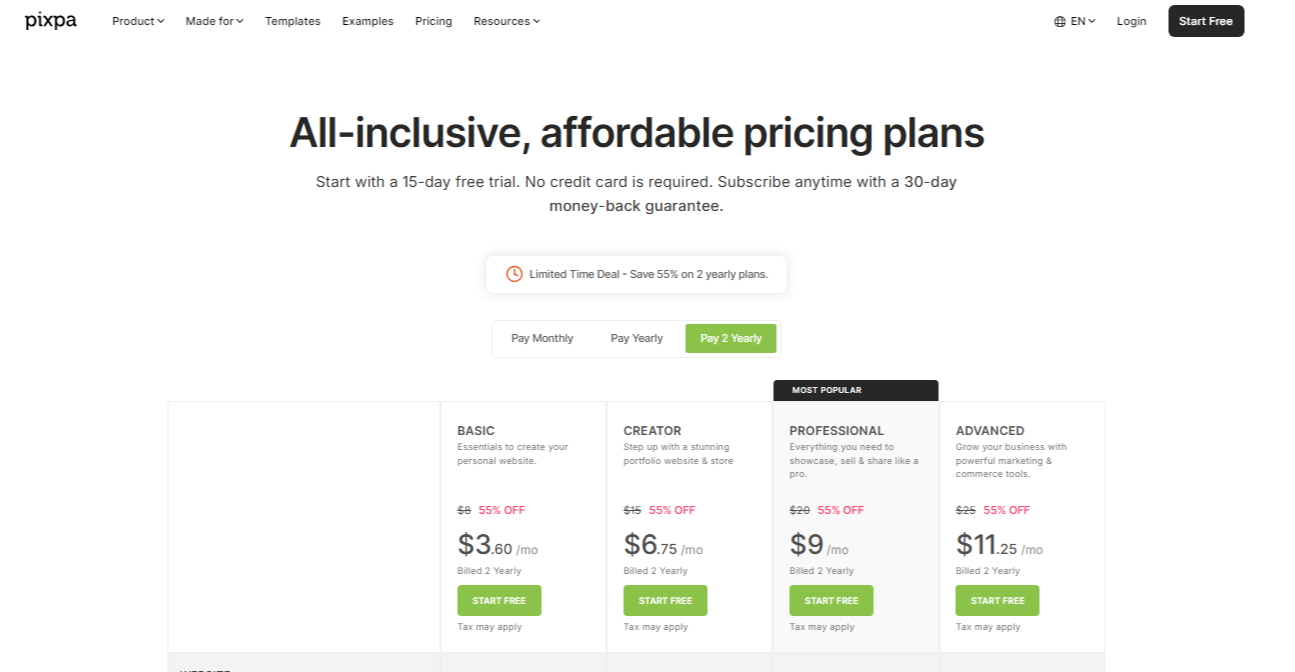
Pixpa shines with its direct and responsive customer support. They use live chat to answer quickly, usually in 3-5 minutes. They also have detailed documentation and video tutorials to help with website creation.
WordPress focuses on its huge community. With over 62% of the CMS market, their forums are vast. Here, developers and experienced users share knowledge and solutions.
User forums are vital for both platforms. Pixpa's forums are more organized, while WordPress's is a big community effort. The web development market is growing fast, showing the need for good support.
Professional creators like Pixpa's personal support, with email and live chat. WordPress users get a lot of community-made resources. Each platform has its own way of supporting users.
Pixpa offers robust website security right at the platform level. They give you automatic SSL certificates. This encrypts data between your site and visitors. It keeps sensitive info safe from hackers.
WordPress security is a bit different. With WordPress on 43% of websites, security plans vary. Self-hosted WordPress sites need extra care. You must install security plugins, update regularly, and keep server settings tight.
Important security points include:
For photographers and creatives, picking a platform with strong malware protection saves time and money. Knowing the security differences helps you choose wisely for your website's safety.
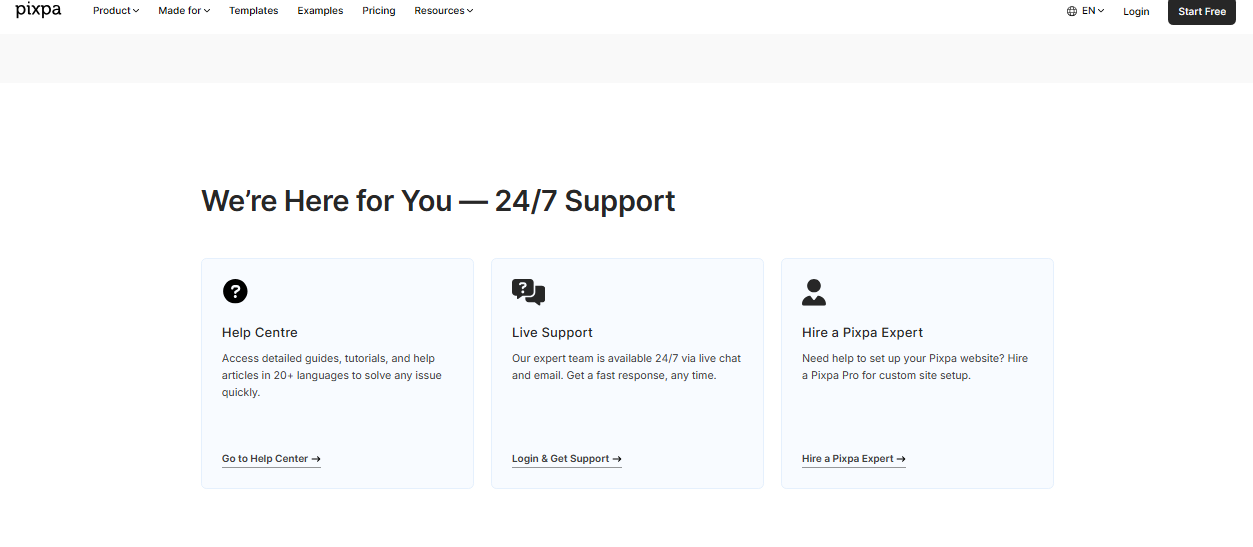
Fast website loading is key to keeping visitors interested. *Pixpa's smart design* reduces image sizes and uses caching. This means your site loads quickly, keeping clients from getting impatient.
WordPress takes a different route with responsive design. It offers lots of customization but requires users to handle performance with plugins and themes. Pixpa makes it easier with templates that are ready to go.
For photographers and artists, Pixpa's mobile-friendly templates are a big help. Its 4.7 ease-of-use rating shows it's easy to use. This means you can create stunning, fast websites that look great on any device.
Pixpa is great for creative people. It has 150+ templates and is easy to use. It's perfect for portfolio sites and small businesses, with prices starting at $3.60 a month.
WordPress is the top choice for many, with 60 percent of the market. It's flexible and customizable but needs more technical know-how. It's best for those who want to grow their site a lot.
Think about what you need before deciding. Do you want something simple or lots of features? Knowing what you need will help you choose the best website builder for you.
.
.
.
.
.
END
Artists and designers need a website builder that's easy to use, fast, and affordable. Pixpa is great for photographers, designers, and artists. WordPress is perfect for those who love to customize their sites.
We'll look closely at what each platform offers. We'll compare their features, prices, and how well they work for different creative fields. We'll see which one gives the best value in 2025.
Knowing the differences between Pixpa and WordPress is key. It helps you choose the right platform for your online space. Whether you're a solo photographer or a big design team, the right builder can make a big difference.
This guide will help you understand what matters most. We'll compare templates, how easy they are to use, prices, and special features. These are important for creatives who need strong ecommerce tools and portfolio platforms.
Understanding Website Builder Platforms in 2025
The world of website builders has changed a lot by 2025. *No-code platforms* are now key, letting anyone build complex sites without needing to know how to code. These systems have easy-to-use interfaces that make designing websites simple for everyone.Website trends show a big move towards AI in design tools. Hostinger is at the forefront with AI tools that can create site layouts in just minutes. The web development market is growing fast, showing how technology is advancing.
Now, there are special platforms for creative people. *Content management systems* are designed for different needs. Pixpa offers over 150 customizable templates, and WordPress is the top CMS, with over 62% market share. This means creators can find the perfect tools for their projects.
Today's website builders do more than just create sites. They also offer e-commerce, marketing, and client management tools. This means you can manage your online business from one place, making it easier than ever.
If you're a photographer, artist, or small business owner, 2025's website builders are very powerful. The key is to pick a platform that fits your goals and how comfortable you are with technology.

Pixpa vs Wordpress: Core Differences and Similarities
Pixpa and WordPress are two big names in website building. Pixpa is made for creative pros, while WordPress is for managing all kinds of websites.The way users interact with these platforms is quite different. Pixpa gets an 8.4 for ease of use, beating WordPress's 7.4. This shows Pixpa is great for photographers and designers who want a simple website builder.
When it comes to design, Pixpa shines with an 8.5 rating. It's just a bit better than WordPress's 7.8. This means Pixpa is better at making websites look good and professional.
Both platforms are strong in e-commerce. Pixpa scores an 8.4, while WordPress is strong with WooCommerce. They both have many payment options and let you customize product pages.
Security and performance are where Pixpa really stands out. It gets an 8.3 for website protection, beating WordPress's 6.4. This makes Pixpa a top choice for those who value data safety.
Even though they're different, both platforms are great at making websites. Your choice depends on what you need, how tech-savvy you are, and your career goals.
Platform Architecture and Hosting Solutions
Website hosting is key to your online platform's performance and reliability. Pixpa and WordPress have different cloud infrastructure solutions. They meet various user needs and technical skill levels.Pixpa offers a fully managed website hosting solution for creative pros. Their cloud setup makes technical management easy. This lets photographers and artists focus on their work, without worrying about server details.
WordPress gives users a choice between self-hosted and hosted platforms. WordPress.com is like Pixpa, offering a managed hosting experience. On the other hand, WordPress.org lets users control their cloud infrastructure themselves, requiring them to choose and set up their hosting.
For those who want simplicity, Pixpa's hosting solution is perfect. WordPress self-hosted platforms need more technical know-how but offer more customization. Your choice depends on your comfort with website management and how much control you want.
Both platforms ensure your website is reliable with regular updates and backups. Pixpa does this automatically. WordPress self-hosted users must manage their site's security and performance themselves. Knowing these differences helps you pick the best website builder for your creative business.

Ease of Use and Learning Curve Analysis
Website builders can be tricky to navigate, especially when comparing different platforms. Pixpa stands out with its user-friendly interface made for creative pros. Its drag-and-drop editor makes building websites easy, letting artists and photographers create stunning portfolios without needing to know a lot of tech.The WordPress learning curve is a bit tougher. WordPress is used by over 34% of websites online, but it can be overwhelming for new users. WordPress.org needs more technical know-how than some other platforms. Users have to learn about hosting, plugins, and setting up their site.
Pixpa is different because it has tools made just for visual storytellers. It has fewer technical hurdles for photographers and designers. Users can easily drag elements, customize galleries, and make professional websites in minutes. You don't need to know how to code, making it easy for creative pros.
WordPress is very flexible but takes more time to learn. Beginners might find it too much, needing help from tutorials and the community. But, for those who know a lot about coding, WordPress is great. Pixpa is better for those who want a quick, easy way to make a website.
Your choice depends on how comfortable you are with tech and what you need for your project. Pixpa is a good choice for creatives who want a fast, beautiful website. WordPress is better for those who are willing to spend time learning its full range of features.
Design Templates and Customization Options
Choosing the right website templates is crucial for your online presence. Pixpa offers over 200 templates designed for creative pros and small businesses. These templates are not only good-looking but also responsive.WordPress has thousands of themes for almost every industry. While Pixpa focuses on quality, WordPress has a wider range. Creative folks will love the built-in customization tools for personalizing their portfolios.
Pixpa's drag-and-drop editor makes changing templates easy. You can adjust layouts, colors, and more without needing to know how to code. WordPress, on the other hand, is more complex but offers deeper customization for those who can code or use page builder plugins.
Photographers, artists, and entrepreneurs might prefer Pixpa's simplicity. Its templates are ready for visual industries, saving time and effort in creating a beautiful website.
Your choice depends on your skills, design taste, and website needs. Both Pixpa and WordPress provide strong options for a stunning online presence.

E-commerce Capabilities and Business Features
Pixpa and WordPress have different ways to sell digital products online. Pixpa is made for creative pros who want easy online selling tools.Creative entrepreneurs will love Pixpa's e-commerce tools. It lets users sell digital goods easily with secure payments. Small businesses can start online stores fast, without tech headaches.
WordPress, with WooCommerce, is a bigger e-commerce system. It's a bit harder to set up but grows with your business. It supports many payment options for customers worldwide.
Pixpa makes managing stores simple, great for photographers and artists. WordPress offers more customization for detailed product sorting and sales tracking.
Both Pixpa and WordPress get high user satisfaction scores. Pixpa scores 90%, WordPress 87%. Your choice depends on your business needs, tech skills, and sales goals.

SEO and Marketing Tools Comparison
Website builders are key in digital marketing strategies. Pixpa and WordPress help creative professionals get seen online in different ways.Pixpa has integrated SEO tools for photographers and artists. It offers customizable meta tags, XML sitemaps, and clean page structures. These tools make it easy to boost website visibility without needing to know a lot about tech.
WordPress offers a more detailed SEO approach. It comes with plugins like Yoast SEO for better meta tags, content analysis, and schema markup. Its wide range of plugins also supports deep social media integration and detailed digital marketing plans.
Marketing features set these platforms apart. Pixpa has easy email marketing and social media sharing tools. WordPress, on the other hand, offers more flexible options through its huge plugin market. This lets users tailor their marketing exactly how they want.
Both platforms support blogging, a key part of digital marketing. WordPress is the top choice for blogging, powering many websites. Pixpa has great blogging tools for creative pros.
Choosing the right platform depends on your marketing needs. Pixpa is great for those wanting a simple, all-in-one solution. WordPress is best for those who need lots of customization options.

Pricing Structure and Value Analysis
Understanding website builder costs can be like solving a puzzle. *Pixpa* and WordPress have different pricing plans for various users. It's important to know these plans to make a good choice.Pixpa has simple pricing from $3.60 to $15 a month, billed every six months. Their plans include key features for creatives, like portfolio sites, online stores, and client galleries. WordPress hosting costs vary based on your needs and technical needs.
WordPress.org is free for those watching their budget. *But be careful* - costs can add up. You'll need to pay for domain names, hosting, premium themes, and plugins. Hosting costs can be $5 to $30 a month, depending on your site's size and visitors.
Pixpa might save you money over time. Their plans include hosting, SSL certificates, and templates made for photographers and artists. WordPress offers more flexibility but might cost more and require more technical work.
When looking at website builder costs, think about your future goals. *Pixpa* has clear pricing, while WordPress is customizable but might be pricier. Your choice depends on your tech skills, budget, and what you need for your site.

Customer Support and Community Resources
Choosing a website builder platform can be tough. Technical support is key to a good online experience. Pixpa and WordPress offer different ways to help users.Pixpa shines with its direct and responsive customer support. They use live chat to answer quickly, usually in 3-5 minutes. They also have detailed documentation and video tutorials to help with website creation.
WordPress focuses on its huge community. With over 62% of the CMS market, their forums are vast. Here, developers and experienced users share knowledge and solutions.
User forums are vital for both platforms. Pixpa's forums are more organized, while WordPress's is a big community effort. The web development market is growing fast, showing the need for good support.
Professional creators like Pixpa's personal support, with email and live chat. WordPress users get a lot of community-made resources. Each platform has its own way of supporting users.
Security Features and Website Protection
Website security is key for creative pros with online portfolios. When looking at Pixpa and WordPress, knowing their security is crucial. It helps keep your digital space safe.Pixpa offers robust website security right at the platform level. They give you automatic SSL certificates. This encrypts data between your site and visitors. It keeps sensitive info safe from hackers.
WordPress security is a bit different. With WordPress on 43% of websites, security plans vary. Self-hosted WordPress sites need extra care. You must install security plugins, update regularly, and keep server settings tight.
Important security points include:
- SSL certificate setup
- Regular automated backups
- Defense against common website threats
- Continuous platform watch
For photographers and creatives, picking a platform with strong malware protection saves time and money. Knowing the security differences helps you choose wisely for your website's safety.

Mobile Responsiveness and Performance
Today, making websites mobile-friendly is a must. Pixpa gets this, offering designs that work well on all devices. It has over 150 templates for creative pros, making sure your site looks great on phones, tablets, and computers.Fast website loading is key to keeping visitors interested. *Pixpa's smart design* reduces image sizes and uses caching. This means your site loads quickly, keeping clients from getting impatient.
WordPress takes a different route with responsive design. It offers lots of customization but requires users to handle performance with plugins and themes. Pixpa makes it easier with templates that are ready to go.
For photographers and artists, Pixpa's mobile-friendly templates are a big help. Its 4.7 ease-of-use rating shows it's easy to use. This means you can create stunning, fast websites that look great on any device.
Conclusion
Choosing the right platform for your website is important. It depends on your needs and what you can do. Pixpa and WordPress are two main options, each suited for different needs.Pixpa is great for creative people. It has 150+ templates and is easy to use. It's perfect for portfolio sites and small businesses, with prices starting at $3.60 a month.
WordPress is the top choice for many, with 60 percent of the market. It's flexible and customizable but needs more technical know-how. It's best for those who want to grow their site a lot.
Think about what you need before deciding. Do you want something simple or lots of features? Knowing what you need will help you choose the best website builder for you.
.
.
.
.
.
.
END
